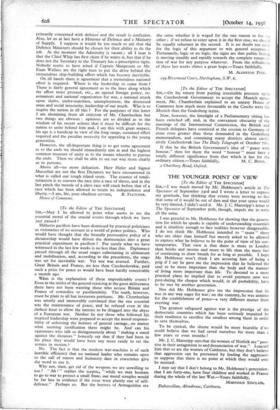[To the Editor of THE SPECTATOR] Stn,—May I be allowed
to point what seems to me the essential moral of the crucial events through which we have just passed ?
Hitherto pacifists have been dismissed by practical politicians as visionaries of no account in a world of power politics. Who would have thought that the brutally provocative policy of a dictatorship would have driven the democracies into a great practical experiment in pacifism ? For surely what we have witnessed in the last few weeks is no less than this. Diplomacy passed through all the usual stages culminating in ultimatum and mobilisation, and, according to the precedents; the stage was set for inevitable war. Yet war was averted. Further, Great Britain and France, no less than Czechoslovakia, paid such a price for peace as would have been hardly conceivable a month ago.
What is the explanation of these unpredictable events ?
Even in the midst of the general rejoicing at the great deliverance there have not been wanting those who accuse Britain and France of cowardice or pusillanimity. The truth, however, must be plain to all but inveterate partisans. Mr. Chamberlain was utterly and immovably convinced that the one essential was the maintenance of peace, and he refused even in the darkest hour to allow the nations to be dragged into the abyss of a European war. Neither he nor those who followed his inspired leadership were prepared to accept the moral responsi- bility of unloosing the horrors of general carnage, no matter what seeming justification there might be. And can his opponents who talk so disingenuously about " making a stand against the dictators " honestly say that if they had been in his place they would have been any more ready to set the armies in motion ?
No. The fact is that the modern war-machine is of such horrible efficiency that no national leader who remains open to the call of reason and humanity dare in conscience give the word to use it.
Why not, then, get rid of the weapons we are unwilling to use ? " Ah ! " replies the sceptic,, " while we may hesitate to go to war to protect a small State, our moral scruples would be far less in evidence if the issue were plainly one of self- defence." Perhaps so. But the horrors of Armageddon are the same whether it is waged for the one reason or for .e other ; if we refuse to enter upon it in the first case, we shoL d be equally reluctant in the second. It is no doubt too eariy for the logic of this argument to win general acceptance. Fortunately, logic or no logic, the signs are that public feeling is moving steadily and rapidly towards the complete renuncia- tion of war for any purpose whatever. From the tribulation of these last weeks shines a great hope.—Yours faithfully, M. ALDERTON PINK.
199 Rivermead Court, Hurlingham, S.W. 6.


















































 Previous page
Previous page